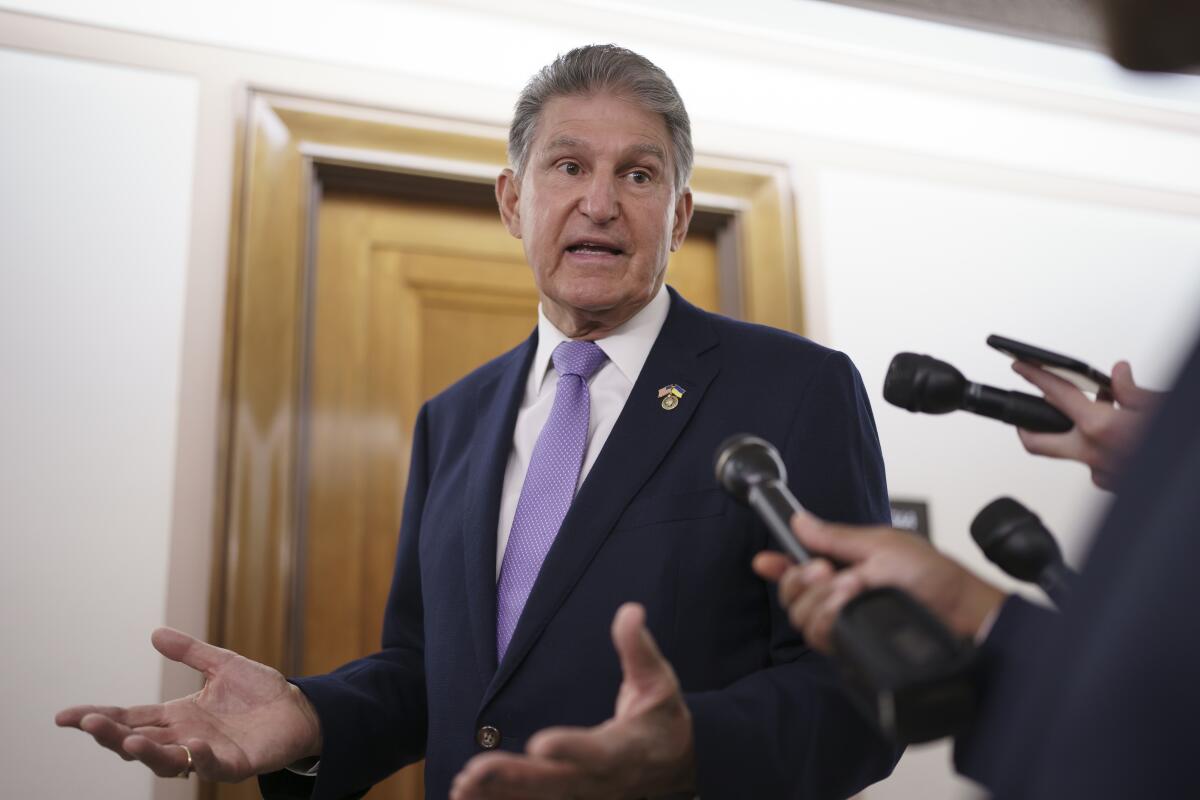Editorial: Surprise Senate deal on climate change should be only the beginning

- Share via
Surprise! Just weeks after President Biden’s climate agenda was declared dead because of opposition from West Virginia Sen. Joe Manchin III (and all 50 Senate Republicans), a sudden reversal came Wednesday night: a deal to move forward with legislation to fight climate change.
The agreement between Manchin and Senate Majority Leader Charles E. Schumer (D-N.Y.) allocates $369 billion in energy and climate change spending over the next 10 years, including a massive investment in renewable energy, pollution reduction, vehicle and building electrification and environmental justice projects. Though climate actions account for the bulk of the spending, they are paired with tax and healthcare measures in a budget reconciliation package now being called the Inflation Reduction Act.
Though it’s a diminished version of the original $555 billion in climate spending proposed under Biden’s expansive but now-deceased Build Back Better bill, the legislation would still be the U.S. government’s single biggest action on climate change in history.
The bill allocates tens of billions of dollars to boost U.S. manufacturing of solar panels, wind turbines and batteries, among other investments in a clean energy economy. But it also funnels money directly to consumers, with incentives to lower the cost of rooftop solar, an extension of the $7,500 tax credit for buying a new electric vehicle, a $4,000 credit for the purchase of a used EV, and rebates for low- and moderate-income families to make home energy efficiency upgrades and install electric appliances such as heat pumps and induction stoves. It includes a program to push oil and gas companies to reduce their emissions of methane, a potent greenhouse gas. There is $60 billion in spending focused on environmental justice for communities hit with the worst harm from climate change and air pollution. Altogether, the bill has potential to cut as much as 1 billion tons of carbon pollution.
A proposal to stop permitting new gas stations in Los Angeles sounds like a logical step. But there are more effective ways to fight climate change.
These are big, meaningful actions that, if signed into law by President Biden, will be transformational for the United States, which has spewed more greenhouse gases into the atmosphere than any other country in history. It would accelerate our shift away from fossil fuels, spur domestic manufacturing of solar panels, electric cars and heat pumps and provide Americans with financial help to switch to zero-emission vehicles and appliances that will lower their energy bills and clean the air we breathe.
Finally, a ray of hope after years of dangerous inaction by U.S. lawmakers. Congress should get this bill to Biden’s desk without delay.
But this legislation should be only the beginning. It’s a step forward, for sure, but lawmakers and Biden delude themselves if they think it is ambitious enough to confront the grave and growing crisis we face from an overheating planet.
The agreement, according to a summary released by Senate Democrats, would put the nation on track to cut greenhouse gas emissions roughly 40% by 2030. That falls short of the 50% to 52% pollution reduction target Biden has pledged under the international Paris climate accord. That’s why it is crucial that the president go beyond this bill and use all tools available to him, through the EPA and other federal agencies and with his executive powers, to put the nation on a credible path toward avoiding catastrophic warming.
A court ruling against the Port of Los Angeles over failed promises to clean the air at its China Shipping terminal shows why we need government regulation, not pledges.
Important pieces of Biden’s climate agenda were stripped away over the last year and a half of negotiations, including a program that would have prodded power utilities to produce more renewable electricity and penalized those that did not. The clean electricity standard, in combination with clean energy tax credits, would have reduced more pollution than any other part of the plan. So there is much more work for Congress and the administration to do, and no time to waste.
It’s unfortunate that in an apparent bid to win the support of Manchin and appease the fossil fuel interests backing him, the deal includes wrongheaded concessions to polluting industries, including requirements for new oil and gas lease sales on public lands and offshore waters, including in the Gulf of Mexico and off the coast of Alaska, as a condition of deploying more wind or solar energy. There’s also a commitment from Democratic leaders to enact separate legislation to reform the permitting of energy infrastructure that could smooth the way for new fossil fuel projects, including a West Virginia gas pipeline of interest to Manchin.
It’s disappointing, though not surprising, that the agreement that ultimately satisfied Manchin’s ever-shifting goal posts includes actions that will enable more burning of fossil fuels that are causing the climate crisis. Our nation cannot continue to prop up these dangerous and politically destabilizing industries and still meet our commitments under the Paris agreement to keep global warming from reaching disastrous levels. This legislation, while welcome and encouraging, must not be the finish line but a starting point.
More to Read
A cure for the common opinion
Get thought-provoking perspectives with our weekly newsletter.
You may occasionally receive promotional content from the Los Angeles Times.












